Delegating before city council is both a tradition and an important part of citizens getting their views before those elected to guide the city and direct the administration on what they want done.
Burlington has some fine delegators; people who do their homework and believe their role is to hold city council accountable. Yesterday Hunter Lawson delegated on the plans the Region of Halton has for the updating of its Official Plan.
Lawson delegated several hours before Curt Benson, Planner for the Region, talked about the five Discussion papers the Region has prepared. Benson referred to the Lawson delegation several times during the long explanation he gave members of Council. Hunter Lawson had been heard and Curt Benson had listened.
Lawson now gives his opinion on what public engagement is all about.
 By Lawson Hunter
By Lawson Hunter
August 12th, 2020
BURLINGTON, ON
Halton Regional Council held a workshop on July 8th and a Council Meeting on July 15th to deal with the Region’s upcoming Official Plan Review (ROPR) and how it relates to Planning changes recently made by the Province through the Greenbelt Plan, the Growth Plan and the Provincial Policy Statement.
A City’s Official Plan must conform to the Region’s Official Plan which must conform to several Provincial Bills and Regulations. Over the past two years, the Provincial government has been busy making drastic amendments to Provincial Plans and the Provincial Policy Statement. This is why the citizens of Burlington must be informed and engaged.

Five Discussion Papers were drawn up that form the key themes of the Regional Official Plan Review:
Climate Change;
Natural Heritage;
Rural and Agricultural System;
Regional Urban Structure; and
North Aldershot Planning Area.
I delegated to Council to urge them to go beyond what the Region has planned for Public Engagement. From what I can gather, it is limited to the an online survey and one or two Public Information Centres, which will be difficult given our challenges with social distancing due to coronavirus. I propose that the City of Burlington hold its own Public Engagement strategy to inform the public of the importance of the Regional Official Plan as it relates not only to Land Use but to the Climate Emergency that this Council has declared. We need a ‘made in Burlington’ engagement plan. (Note: Curt Benson, Director of Planning Services at the Region, later told Council that there would be 4 PICs)
 Though the Regional Official Plan is not slated to be finalized until Q4 2021, and the Region has hinted that Public Engagement will be undertaken – my concern centres on the fact that public engagement was slated to run from July 15th to Sept. 28th. Summer months are well known to be a slow time to engage the public. The time between July 15th, the day that Regional Council accepted the Discussion Papers, and July 29th, the day that public notice was sent of a request for comments, is a concern. The next Regional Council meeting will be Sept. 16th, when it’s expected Council will discuss public feedback, which is twelve days before the public engagement period ends. Neither inspires confidence that public engagement will be full and effective. (Note: Benson later told Council that Regional Staff would require considerable time to evaluate and prepare a report for Council’s review)
Though the Regional Official Plan is not slated to be finalized until Q4 2021, and the Region has hinted that Public Engagement will be undertaken – my concern centres on the fact that public engagement was slated to run from July 15th to Sept. 28th. Summer months are well known to be a slow time to engage the public. The time between July 15th, the day that Regional Council accepted the Discussion Papers, and July 29th, the day that public notice was sent of a request for comments, is a concern. The next Regional Council meeting will be Sept. 16th, when it’s expected Council will discuss public feedback, which is twelve days before the public engagement period ends. Neither inspires confidence that public engagement will be full and effective. (Note: Benson later told Council that Regional Staff would require considerable time to evaluate and prepare a report for Council’s review)
Public engagement is also noted for Phase 3 of the process but by that time Regional staff will have prepared ‘preferred options’ which will limit public discussion, as we have seen over and over again – a public display of an either/or choice or worse, “adopt this or nothing”.
In comparison, the City of Burlington has held extensive public engagement regarding the City’s ‘Adopted Official Plan’ and specifically the ‘Taking a Closer Look at Downtown’. Surveys (online and paper); 7 Citizen Action Labs; 17 pop-up events; outreach to 130 students and the Burlington Youth Council and the Halton Multicultural Council; walking tours; 3 drop-in sessions; and an upcoming online Town Hall on Aug. 18th. An unprecedented amount of effort.

Scoped Review of the Downtown portion of the affirmed but not yet adopted Official Plan
So I must ask, “Is Downtown Burlington more important than North Aldershot, the Rural and Agricultural System, Climate Change?” Each of the five topics that the Region is seeking public comment on is important in its own right. How much emphasis does the Region and the City place on these planning issues?
The timing of public engagement needs to be pushed back into the Fall to allow for a comprehensive process and full disclosure so that residents can digest, and discuss among themselves, the various reports, some of which are longer than 100 pages.
If the Region is not prepared to do this, then the City of Burlington must insist on these changes so that at least Burlington is prepared to look into the future and make its own Official Plan the best that it can be.
A municipal Official Plan does not inspire most residents to take notice. Despite the endless discussions this Council has had on its ‘Adopted Official Plan’, most Burlington citizens, outside of a few committed downtown residents, have only a vague notion of the significance an Official Plan has on how this city will look and operate for decades to come.
We need the Province to hear more than just a nice letter stating that the Region is discussing Climate Change and Natural Heritage and the rest. Each deserves comprehensive public engagement not only with ‘stakeholders’ but with the public that will be affected by those issues and by the Province’s changes to Plans such as the Growth Plan and the Greenbelt Plan, to specific topics such as lessening Environmental Assessments and removing restrictions that protect Endangered Species and eliminating zoning designations.
This is, perhaps, our best chance to let the Provincial government know exactly how we feel about those changes and how we want our city and region to look, feel, and develop for our children and future generations.

Appleby GO station – one of the hubs (now called MTSA’s) – Major Transit Service Area – where the city wants intensive development to take place. Think in terms of concentrations of apartments
I’m sure someone will note that it is the traditional practice of the Province to allow public feedback through letters, online postings or the Environmental Registry. But, you also have to admit that several of these changes were made under the cover of the COVID crisis, behind a wall of secrecy or hidden within some omnibus bill.
This is our chance to be heard. Public Engagement needs to reach the highest level we have ever known in this community. We need to pull out all the stops, educate, explain and underscore that changes to legislation and the Official Plan will have a major impact on our community for the next 30 years.
The Official Plan is the most significant tool that a city has to influence how neighbourhoods will look. How and where parks and amenities are located. What mixture of high, low and mid-level housing will be allowed. What transit and transportation methods will have priority. Where and what kind of development will be permitted – rural or urban, greenfield or intensification. Will we have walkable, complete streets or continue to bow to the car culture? Where and what kind of industry and business will be located in appropriate areas?

Lawson Hunter
All of these things, and more, affect our promise to reduce GHG emissions over that same 30 years. The Land Use policies ‘we’ decide to enshrine will ensure that our air is clean, our neighbourhoods are livable, that we can accept the influx of new residents that we know are coming, 1.1 million residents in Halton by 2051, depending on whose forecasts you choose to accept.
Public Engagement, if done right, represents an unparalleled opportunity to discover what the public really wants our city, region and planet to look like – now and in the future.
Does that not require an extensive, well-funded and timely occasion to inform and listen to what the majority of citizens want?














